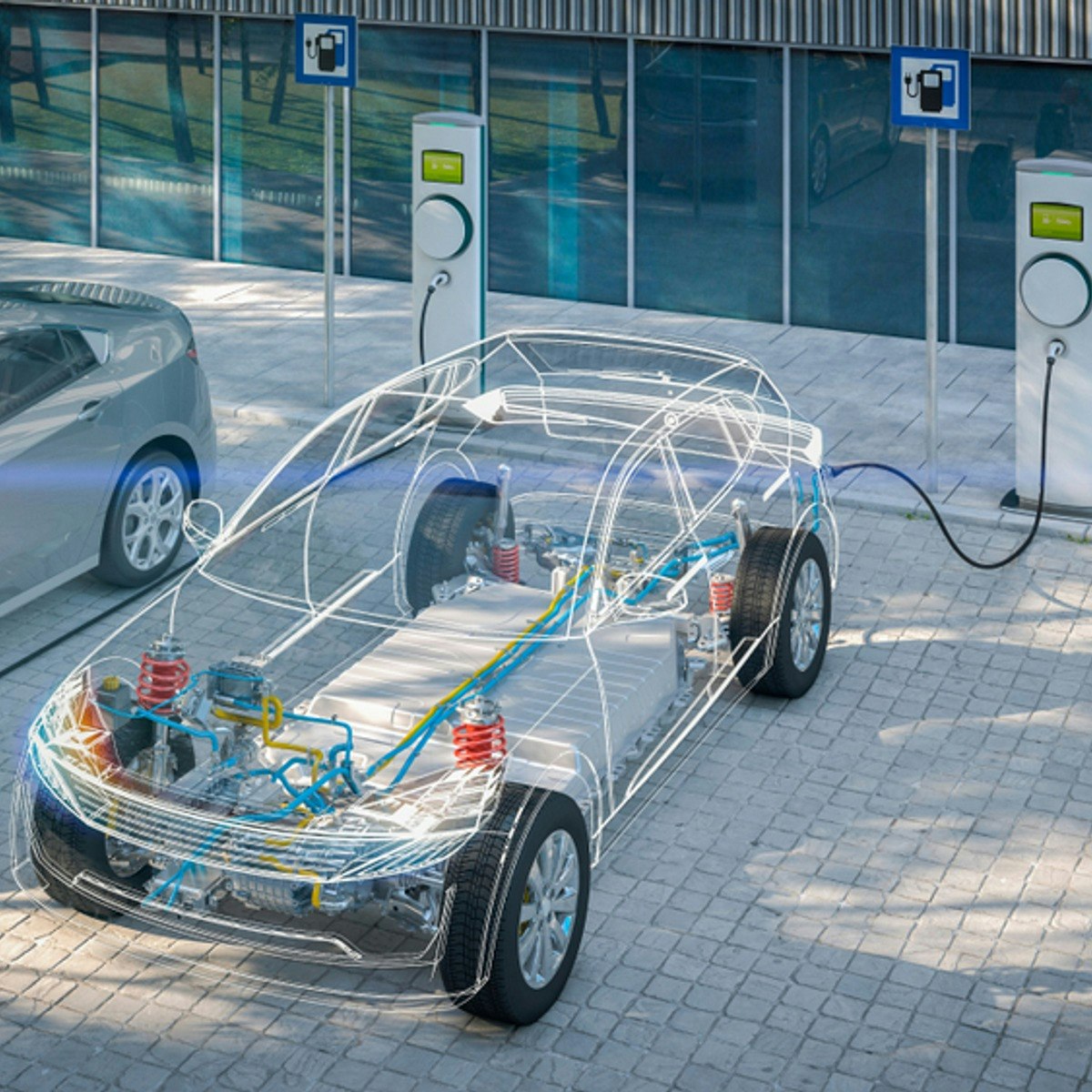Electric Vehicles
Introduction to Electric Vehicles
Electric Vehicles, commonly known as EVs, represent a significant shift in transportation technology, utilizing electric motors powered by rechargeable batteries instead of traditional internal combustion engines that rely on fossil fuels. This transition is driven by a global push towards more sustainable and environmentally friendly alternatives in the face of climate change and air quality concerns. The rise of EVs is not just a change in how we power our vehicles; it's reshaping industries, influencing energy policy, and offering new avenues for technological innovation.
Working in the electric vehicle sector can be particularly engaging due to its dynamic and rapidly evolving nature. Imagine contributing to the design of a next-generation battery that significantly extends an EV's range, or developing software that optimizes charging networks for millions of users. There's also the excitement of being part of a movement that directly addresses environmental challenges, contributing to a cleaner future. The field is ripe with opportunities for problem-solvers and innovators who are passionate about technology and sustainability.
Introduction to Electric Vehicles
This section will lay the groundwork for understanding what electric vehicles are, the different forms they take, and the fundamental pros and cons associated with their adoption. It's a starting point for anyone curious about this transformative technology, whether you're a student considering a future career, a professional looking to pivot, or simply an enthusiast eager to learn more.
Defining Electric Vehicles (EVs) and Their Significance
An Electric Vehicle (EV) is a vehicle that uses one or more electric motors for propulsion. Unlike conventional vehicles that rely on an internal combustion engine (ICE) powered by gasoline or diesel, EVs are powered by electricity stored in rechargeable batteries. This fundamental difference is the cornerstone of their significance in the modern world.
The importance of EVs stems from several key factors. Firstly, they offer a pathway to reduce greenhouse gas emissions from the transportation sector, a major contributor to climate change. By using electricity, particularly from renewable sources, EVs can significantly lower the carbon footprint associated with driving. Secondly, EVs can help improve air quality in urban areas by eliminating tailpipe emissions of pollutants like nitrogen oxides and particulate matter, which are harmful to human health. Thirdly, the rise of EVs is spurring innovation in battery technology, power electronics, and software, creating new economic opportunities and transforming the automotive industry.
For individuals considering a career in this field, the EV sector offers a chance to be at the forefront of a technological revolution with profound societal impact. It's a domain that blends cutting-edge engineering with a mission to create a more sustainable future. The skills developed in the EV industry, from battery chemistry to software development and charging infrastructure management, are increasingly in demand across various sectors. OpenCourser provides a vast library of courses to explore these areas, which you can easily browse through to find resources that match your interests and career goals.
Overview of EV Types (BEV, PHEV, HEV)
The term "electric vehicle" encompasses a range of technologies, each with distinct characteristics. Understanding these differences is crucial for anyone looking to delve deeper into the EV world. The main types include Battery Electric Vehicles (BEVs), Plug-in Hybrid Electric Vehicles (PHEVs), and Hybrid Electric Vehicles (HEVs).
Battery Electric Vehicles (BEVs) are fully electric, meaning they run solely on electricity stored in a high-capacity battery pack. They have no internal combustion engine and produce zero tailpipe emissions. BEVs are charged by plugging into an external electricity source, such as a home charger or a public charging station. Examples include the Tesla Model 3, Nissan Leaf, and Chevrolet Bolt.
Plug-in Hybrid Electric Vehicles (PHEVs) combine an electric motor with an internal combustion engine. They have a smaller battery pack than BEVs, allowing them to travel a certain distance on electricity alone (typically 20-50 miles) before the gasoline engine kicks in. PHEVs can be charged from an external electricity source, like BEVs, but also refueled with gasoline. This offers a stepping stone for those not yet ready to go fully electric, providing electric-only operation for shorter trips and the backup of a gasoline engine for longer journeys. Examples include the Toyota Prius Prime and Ford Escape PHEV.
Hybrid Electric Vehicles (HEVs) also feature both an electric motor and an internal combustion engine. However, unlike PHEVs, their batteries are primarily charged through regenerative braking and by the internal combustion engine, not by plugging into an external source. The electric motor assists the gasoline engine to improve fuel efficiency and reduce emissions, but HEVs cannot typically travel long distances on electric power alone. The original Toyota Prius is a classic example of an HEV.
For those exploring careers, each EV type presents unique engineering and design challenges. BEVs demand expertise in high-capacity battery systems and advanced motor control. PHEVs require sophisticated integration of two distinct powertrains. HEVs focus on optimizing the synergy between the engine and electric motor for maximum efficiency. Understanding these nuances can help you tailor your learning path. You may find the following introductory courses helpful to build a foundational understanding.
Key Benefits and Challenges of EV Adoption
The shift towards electric vehicles brings a host of benefits, but it's not without its hurdles. A balanced understanding of these aspects is essential for anyone considering a future in this industry or thinking about EV ownership.
Benefits of EV Adoption:
- Environmental Improvement: EVs produce zero tailpipe emissions, contributing to cleaner air in cities and reducing smog. When powered by renewable energy sources, their overall carbon footprint is significantly lower than that of gasoline cars, helping to combat climate change.
- Lower Running Costs: Electricity is generally cheaper than gasoline on a per-mile basis. EVs also have fewer moving parts in their powertrain, often resulting in lower maintenance costs (e.g., no oil changes).
- Improved Performance: Electric motors provide instant torque, leading to quick acceleration and a smooth, quiet driving experience.
- Energy Security: Reducing reliance on imported oil can enhance national energy security for many countries.
- Technological Advancement: The EV revolution drives innovation in battery technology, software, and smart grid integration, creating new industries and jobs.
Challenges of EV Adoption:
- Higher Upfront Cost: EVs typically have a higher purchase price than comparable gasoline vehicles, although government incentives and falling battery prices are helping to close this gap.
- Range Anxiety: While EV range has improved significantly, some consumers still worry about the distance an EV can travel on a single charge and the availability of charging stations on long journeys.
- Charging Infrastructure: The availability and accessibility of public charging stations, especially fast chargers, need to expand to support widespread EV adoption. Charging times can also be a concern compared to the quick refueling of gasoline cars.
- Battery Lifecycle: The production of EV batteries involves mining raw materials like lithium and cobalt, which can have environmental and ethical implications. Proper recycling and disposal of batteries at the end of their life are also crucial challenges being addressed.
- Grid Impact: Widespread EV charging could place additional strain on existing electricity grids, requiring upgrades and smart charging solutions to manage demand.
For those aspiring to work in the EV sector, these challenges represent opportunities. Engineers are working on more affordable and energy-dense batteries, faster charging solutions, and more efficient grid integration. Policymakers and urban planners are developing strategies for expanding charging infrastructure. Addressing these challenges is key to accelerating EV adoption and realizing the full potential of electric mobility.
These books provide deeper insights into the technology and the broader impact of electric vehicles.
History and Evolution of Electric Vehicles
The journey of electric vehicles is a fascinating tale of early promise, a long period of dormancy, and a dramatic resurgence in the 21st century. Understanding this history provides context for the current EV boom and appreciation for the technological and societal shifts that have shaped it. It's a story relevant not only to historians and technology enthusiasts but also to engineers and business strategists navigating the future of mobility.
Early Developments (19th Century)
Believe it or not, electric vehicles were among the earliest automobiles, predating or appearing concurrently with internal combustion engine vehicles. The 19th century was a period of intense experimentation with various forms of propulsion. As early as the 1830s, inventors in countries like Hungary, the Netherlands, and the United States were creating small-scale electric cars. Around 1832, Scottish inventor Robert Anderson is credited with developing the first crude electric carriage.
The invention of rechargeable batteries in 1859 by Gaston Planté (lead-acid battery) was a pivotal moment, making electric vehicles a more practical proposition. By the late 1800s, electric cars were gaining popularity. They were quiet, easy to operate (no hand-cranking like early gasoline cars), and didn't produce smelly exhaust fumes. In the U.S., William Morrison of Des Moines, Iowa, built a successful six-passenger electric vehicle around 1890, which could reach a top speed of 14 miles per hour. This vehicle, essentially an electrified wagon, helped spark considerable interest.
By the turn of the 20th century, electric cars held a strong position in the nascent automotive market. In 1900, about a third of all vehicles on U.S. roads were electric. New York City even had a fleet of electric taxis. Innovators like Thomas Parker in England also designed and built practical electric cars during this era. These early successes demonstrated the viability of electric propulsion, laying a foundation that would be revisited many decades later.
20th-Century Decline and 21st-Century Resurgence
Despite their early popularity, electric vehicles faced a significant decline in the early 20th century. The primary catalyst for this shift was Henry Ford's introduction of the mass-produced Model T in 1908. The Model T made gasoline-powered cars significantly more affordable and accessible to the general public. By 1912, a gasoline car could cost as little as $650, while an electric roadster might sell for $1,750. The invention of the electric starter by Charles Kettering in 1912 eliminated the cumbersome hand-crank needed to start gasoline engines, further eroding a key advantage of EVs.
Several other factors contributed to the decline of EVs. The discovery of large petroleum reserves, particularly in Texas, made gasoline cheap and widely available. Simultaneously, a better system of roads began connecting cities, and Americans, eager to explore longer distances, found the limited range and speed of early EVs less appealing than their gasoline counterparts. By the 1930s, electric cars had largely disappeared from the mainstream market, relegated to niche applications like milk floats and golf carts.
The resurgence of electric vehicles began in earnest in the late 20th and early 21st centuries, driven by growing concerns about air pollution, oil dependency, and climate change. The 1973 oil crisis sparked renewed, albeit limited, interest. However, it wasn't until the late 1990s and early 2000s, with vehicles like the General Motors EV1 and the Toyota Prius (a hybrid), that modern EVs began to capture public attention again. Advances in battery technology, power electronics, and electric motor design, coupled with increasing environmental awareness and government incentives, set the stage for the current EV boom. The 21st century has witnessed a dramatic comeback, transforming electric vehicles from a historical curiosity into a leading solution for future transportation.
Role of Companies like Tesla in Modern EV Adoption
The modern resurgence of electric vehicles cannot be fully discussed without acknowledging the pivotal role played by companies like Tesla. Founded in 2003, Tesla, Inc. approached the electric car not just as an alternative, but as a superior form of transportation, emphasizing performance, technology, and a desirable brand image. Their strategy significantly shifted public perception and spurred the established automotive industry to accelerate their own EV programs.
Tesla's introduction of the Roadster in 2008, a high-performance electric sports car, demonstrated that EVs could be exciting and desirable, challenging the prevailing image of electric cars as slow or utilitarian. The subsequent launch of the Model S in 2012 further solidified this image, offering long range, cutting-edge technology (like over-the-air software updates and a large touchscreen interface), and impressive performance. This vehicle, in particular, garnered widespread acclaim and proved that EVs could compete with, and even surpass, luxury gasoline-powered cars in many respects.
Beyond the vehicles themselves, Tesla's approach to building a dedicated Supercharger network addressed one of the key barriers to EV adoption: range anxiety and charging convenience for long-distance travel. This vertically integrated strategy, encompassing vehicle design, battery manufacturing (through partnerships and later, in-house efforts), software development, and charging infrastructure, set a new benchmark in the industry. While other automakers were also developing EVs, Tesla's bold vision and rapid innovation acted as a powerful catalyst, forcing the entire automotive sector to take electric mobility more seriously and invest more heavily in its development. Their success has undoubtedly accelerated the global transition towards electric vehicles.
Key Components and Technologies
Understanding the core components and technologies that power electric vehicles is essential for anyone looking to work in or deeply comprehend this field. From the sophisticated battery systems that store energy to the powerful electric motors that deliver motion, and the crucial charging infrastructure that keeps them running, each element plays a vital role. This section delves into these key technological pillars, providing insights relevant to engineering students, industry professionals, and curious learners alike.
Battery Systems (Li-ion, Solid-State)
The battery system is arguably the most critical component of an electric vehicle, determining its range, performance, cost, and charging time. Currently, Lithium-ion (Li-ion) batteries dominate the EV market due to their high energy density, good power output, and relatively long cycle life. These batteries are not a single chemistry, but rather a family of chemistries, each with different trade-offs in terms of energy density, power, lifespan, safety, and cost. Common Li-ion chemistries include Nickel Manganese Cobalt (NMC), Nickel Cobalt Aluminum (NCA), and Lithium Iron Phosphate (LFP).
Ongoing research and development are intensely focused on improving Li-ion battery technology. Key areas of innovation include increasing energy density (to achieve longer range with smaller, lighter batteries), reducing costs (which still represent a significant portion of an EV's price), enhancing safety, and extending lifespan. The battery management system (BMS) is a crucial electronic system that monitors and manages the battery pack's state of health, state of charge, temperature, and cell balancing, ensuring safe and optimal operation.
A highly anticipated next-generation technology is the solid-state battery. Unlike conventional Li-ion batteries that use liquid electrolytes, solid-state batteries employ a solid electrolyte. This change promises several potential advantages, including higher energy density, improved safety (as solid electrolytes are generally less flammable than liquid ones), faster charging capabilities, and longer lifespan. Companies like Toyota, Samsung, and Volkswagen, along with numerous startups, are heavily investing in solid-state battery research and development, with some aiming for commercialization in the mid to late 2020s. While challenges in manufacturing scalability and cost remain, solid-state technology holds the potential to revolutionize the EV industry further.
For those interested in the technical aspects of EV batteries, these courses offer valuable knowledge.
The following books delve deeper into battery technologies.
Electric Motors and Power Electronics
Electric motors are the heart of an EV's propulsion system, converting electrical energy from the battery into mechanical energy to drive the wheels. Unlike internal combustion engines with hundreds of moving parts, electric motors are relatively simple, compact, and highly efficient. They also provide instant torque, resulting in quick acceleration and a smooth driving experience. Common types of electric motors used in EVs include Permanent Magnet Synchronous Motors (PMSM) and AC Induction Motors.
Power electronics play a crucial role in controlling the flow of electrical energy between the battery, the motor, and other components. The inverter is a key power electronic device that converts the DC (Direct Current) power from the battery into AC (Alternating Current) power required by most EV motors. It also controls the motor's speed and torque. During regenerative braking, the inverter converts AC power generated by the motor (acting as a generator) back into DC power to recharge the battery.
Other important power electronic components include the DC-DC converter, which steps down the high voltage from the main battery pack to power the vehicle's 12-volt auxiliary systems (lights, infotainment, etc.), and the onboard charger, which converts AC power from the grid into DC power to charge the main battery. The efficiency, reliability, and cost of these power electronic systems are critical for overall EV performance and affordability. Advances in semiconductor materials, such as Silicon Carbide (SiC) and Gallium Nitride (GaN), are enabling more compact, efficient, and higher-power-density power electronics for EVs.
These courses offer a deeper dive into the electrical systems of EVs.
This book provides a comprehensive overview of electric machines and drives.
Charging Infrastructure (Level 1, DC Fast Charging)
Charging infrastructure is the backbone that supports the practicality and convenience of electric vehicles. It encompasses the various methods and equipment used to replenish an EV's battery. Understanding the different charging levels and connector types is key to appreciating the EV ecosystem. Charging is broadly categorized into AC (Alternating Current) charging and DC (Direct Current) fast charging.
AC Charging:
- Level 1 Charging: This uses a standard 120-volt household outlet. It's the slowest method, typically adding 2-5 miles of range per hour of charging. Level 1 charging is convenient for overnight charging at home for PHEVs or BEVs with smaller batteries, or for topping off when faster options aren't available.
- Level 2 Charging: This uses a 240-volt power source, similar to what large appliances like ovens or clothes dryers use. Level 2 chargers are common in homes (requiring professional installation), workplaces, and public locations. They can add 10-60 miles of range per hour, making them suitable for fully charging a BEV overnight or significantly topping up during the day.
DC Fast Charging (often referred to as Level 3, though this isn't an official SAE term for DC):
- DC Fast Charging: This method bypasses the vehicle's onboard charger and supplies high-voltage DC power directly to the battery, enabling much faster charging speeds. DC fast chargers can add 100-250 miles of range (or even more with ultra-fast chargers) in as little as 20-30 minutes, depending on the vehicle and charger specifications. These are crucial for enabling long-distance EV travel and are typically found along major highways and in urban centers. Common DC fast charging standards include CCS (Combined Charging System), CHAdeMO, and Tesla's Supercharger network (which is increasingly being opened to other manufacturers).
The development of a robust, reliable, and widely accessible charging network is a critical factor for mass EV adoption. This includes expanding the number of public chargers, ensuring interoperability between different charging networks and vehicle brands, and developing smart charging solutions that can manage charging demand to avoid straining the electricity grid. Careers in this area involve electrical engineering, urban planning, software development for charging station management, and policy development.
The following courses provide insights into EV charging systems and infrastructure design.
Environmental Impact and Sustainability
The narrative surrounding electric vehicles is heavily intertwined with their potential to mitigate environmental damage caused by traditional transportation. However, a comprehensive understanding requires looking beyond just tailpipe emissions. This section examines the lifecycle environmental impact of EVs, the challenges related to battery recycling and disposal, and a comparison with internal combustion engine vehicles, providing a nuanced perspective for those interested in the sustainability aspects of EV technology.
Lifecycle Emissions Analysis
When evaluating the environmental impact of electric vehicles, it's crucial to conduct a lifecycle emissions analysis, also known as a "well-to-wheel" or "cradle-to-grave" assessment. This approach considers all emissions generated throughout the vehicle's entire life, from the extraction of raw materials and manufacturing of components, through the vehicle's operational phase (driving and charging), to its end-of-life (recycling and disposal).
The manufacturing phase of an EV, particularly the production of its battery, typically has a higher carbon footprint than that of an internal combustion engine (ICE) vehicle. This is due to the energy-intensive processes involved in mining and refining materials like lithium, cobalt, nickel, and manganese, as well as the battery cell and pack assembly. However, this initial "carbon debt" is usually offset during the vehicle's operational phase.
During operation, BEVs produce zero tailpipe emissions, which is a significant advantage in improving local air quality. The overall greenhouse gas emissions associated with driving an EV depend heavily on the source of the electricity used for charging. If the electricity comes primarily from renewable sources like solar, wind, or hydropower, the operational emissions are very low. Conversely, if the electricity is generated mainly from fossil fuels like coal or natural gas, the operational emissions will be higher, though generally still lower than those of an equivalent ICE vehicle. Numerous studies have shown that, even with current electricity generation mixes in most countries, EVs result in lower overall lifecycle greenhouse gas emissions compared to conventional gasoline cars. As electricity grids become cleaner, the environmental benefits of EVs will continue to grow.
Recycling and Battery Disposal Challenges
The increasing number of electric vehicles on the road brings to the forefront the challenge of managing their batteries at the end of their operational life, which is typically 8-15 years. EV batteries contain valuable materials like lithium, cobalt, nickel, and manganese, as well as potentially hazardous components. Effective recycling and disposal methods are crucial to minimize environmental impact and recover valuable resources, contributing to a circular economy.
Current battery recycling processes can be complex and costly. The main methods include pyrometallurgy (smelting), hydrometallurgy (using chemical solutions to extract metals), and direct recycling (recovering cathode materials directly). Each method has its own advantages and disadvantages in terms of recovery rates, energy consumption, and environmental footprint. A significant challenge is the diversity of battery chemistries and designs, which makes it difficult to develop standardized and efficient recycling processes. Furthermore, the economic viability of recycling can be influenced by fluctuating prices of raw materials; for instance, as cobalt content in batteries decreases, the economic incentive for recycling might diminish unless efficient recovery of other materials like lithium becomes more profitable.
Beyond recycling, there's growing interest in "second-life" applications for EV batteries. Even when a battery no longer meets the demanding requirements for automotive use (typically when its capacity drops to around 70-80% of its original state), it can still be suitable for less demanding stationary energy storage applications, such as backup power for homes or businesses, or for grid stabilization. This can extend the useful life of the battery before it needs to be recycled, further improving its overall sustainability. Developing robust systems for collecting, testing, and repurposing used EV batteries is an active area of research and business development.
This book offers insights into the broader context of energy and sustainability, relevant to understanding the EV ecosystem.
EVs vs. Internal Combustion Engine Vehicles
A direct comparison between electric vehicles (EVs) and internal combustion engine (ICE) vehicles reveals distinct advantages and disadvantages across various metrics, primarily environmental impact, running costs, and performance. While EVs are often touted as the cleaner alternative, a nuanced understanding is essential.
From an environmental standpoint, the most significant advantage of BEVs is the complete absence of tailpipe emissions. This directly translates to improved air quality in urban environments, reducing pollutants like nitrogen oxides, particulate matter, and volatile organic compounds that contribute to respiratory problems and smog. Over their entire lifecycle, including manufacturing and electricity generation for charging, EVs generally have a lower carbon footprint than ICE vehicles, especially in regions with a cleaner electricity grid. As renewable energy sources become more prevalent, this advantage will only widen.
In terms of running costs, EVs typically offer savings. Electricity is often cheaper per mile than gasoline or diesel, and EV maintenance can be less expensive due to fewer moving parts in the powertrain (e.g., no oil changes, spark plugs, or complex exhaust systems). However, the initial purchase price of an EV is often higher than a comparable ICE vehicle, though government incentives and decreasing battery costs are narrowing this gap. Performance-wise, EVs offer instant torque, leading to rapid acceleration and a quieter, smoother driving experience. ICE vehicles, on the other hand, still hold an advantage in terms of refueling time and the established ubiquity of gas stations, which mitigates range anxiety for long-distance travel. The energy density of gasoline also currently allows for longer ranges in many ICE models compared to similarly sized EVs, although EV ranges are continually improving.
The choice between an EV and an ICE vehicle often comes down to individual priorities, driving needs, budget, and access to charging infrastructure. However, the broader trend indicates a clear shift towards electrification, driven by environmental concerns, technological advancements, and evolving consumer preferences.
This book provides a perspective on the interplay between energy, transportation, and the environment.
Economic Trends and Market Dynamics
The rise of electric vehicles is not just a technological shift but also a major economic event, reshaping the automotive industry and its vast supply chains. Understanding the economic trends and market dynamics is crucial for investors, business strategists, policymakers, and anyone looking to build a career in this burgeoning sector. This section explores global market growth, the impact of government incentives, and the transformation of automotive supply chains.
Global Market Growth Projections
The global electric vehicle market has experienced explosive growth in recent years and is projected to continue its upward trajectory. In 2023, nearly 14 million new electric cars were registered globally, a 35% increase from 2022 and more than six times higher than in 2018. Electric cars accounted for about 18% of all cars sold in 2023. Looking ahead, forecasts indicate sustained strong growth. Some analysts predict that global EV sales could reach 17 million by the end of 2024, potentially accounting for 20% of total car sales. By 2030, the global electric vehicle stock (excluding two/three-wheelers) is projected to reach nearly 250 million vehicles under existing policies, and could rise to 525 million by 2035, meaning one in four vehicles on the road would be electric. BloombergNEF projects that EVs could reach 45% of global passenger-vehicle sales by 2030 and 73% by 2040 in their Economic Transition Scenario.
The market size in terms of revenue is also substantial. One projection estimates the global EV market at USD 988.70 billion in 2025, forecasting it to reach around USD 2,529.10 billion by 2034, growing at a CAGR of 11%. Another report valued the market at USD 500.48 billion in 2023 and projects growth to USD 1,891.08 billion by 2032, at a CAGR of 13.8%. This growth is driven by several factors including falling battery costs, improving vehicle range, expanding charging infrastructure, supportive government policies, and increasing consumer awareness and preference for sustainable transportation.
Regionally, China, Europe, and the United States are the dominant markets, accounting for 95% of electric car sales in 2023. However, sales in emerging markets, particularly in Southeast Asia and Brazil, are also beginning to show significant growth. The cumulative value of EV sales across all segments is anticipated to reach trillions of dollars in the coming decades, representing a massive economic opportunity. McKinsey projects that worldwide demand for EVs will grow sixfold from 2021 through 2030, with annual unit sales increasing from 6.5 million to roughly 40 million over that period.
For those exploring careers, this rapid market expansion translates into a growing demand for skilled professionals across the entire EV value chain, from research and development to manufacturing, sales, and infrastructure development. OpenCourser's deals page can be a useful resource for finding discounts on courses that can help you acquire these in-demand skills.
Government Incentives and Subsidies
Government incentives and subsidies have played a crucial role in stimulating the initial growth of the electric vehicle market and continue to be a significant factor in many regions. These policies aim to reduce the upfront cost of EVs, encourage consumer adoption, and support the development of charging infrastructure and domestic manufacturing.
Common forms of incentives include direct purchase rebates or tax credits for consumers buying new EVs. For example, the U.S. has offered federal tax credits, and many states provide additional incentives. Similar schemes exist in numerous European countries and in China, although the nature and generosity of these subsidies can change over time. Some governments also offer tax exemptions or reductions for EVs, such as lower registration fees or road taxes. Non-financial incentives can include access to high-occupancy vehicle (HOV) lanes, preferential parking, or exemptions from congestion charges in city centers.
Beyond consumer-facing incentives, governments also support the EV industry through grants and loans for research and development, funding for charging infrastructure deployment, and investments in battery manufacturing facilities. For instance, the U.S. Infrastructure Investment and Jobs Act and the Inflation Reduction Act have allocated significant funding to support EV manufacturing and infrastructure. Policies like these are designed to build a robust domestic EV ecosystem, create jobs, and help meet national climate targets. However, the effectiveness and design of these incentives are often debated, with discussions around their cost-effectiveness, equity implications, and the point at which the market can sustain itself without such support. The phasing out or alteration of subsidies, as seen in some markets, can also create short-term fluctuations in EV sales.
Impact on Automotive Supply Chains
The transition to electric vehicles is profoundly reshaping automotive supply chains, which have been built around the internal combustion engine for over a century. This shift presents both significant challenges and opportunities for existing suppliers and new entrants. The most obvious change is the move away from components like engines, transmissions, fuel injection systems, and exhaust systems, towards EV-specific components such as batteries, electric motors, power electronics, and sophisticated thermal management systems.
Battery production, in particular, is creating an entirely new and complex supply chain. This involves the mining and refining of raw materials like lithium, cobalt, nickel, manganese, and graphite, followed by the manufacturing of battery cells, modules, and packs. Currently, the supply chain for these materials and components is highly concentrated in a few countries, raising concerns about supply security, price volatility, and geopolitical risks. For example, China plays a dominant role in the refining of many battery materials and in battery cell manufacturing. This has spurred efforts in regions like North America and Europe to develop more localized and resilient battery supply chains, including investments in domestic mining, refining, and gigafactories.
The shift to EVs also requires new skills and manufacturing processes. Automakers and suppliers are investing heavily in retooling factories and retraining workforces. There's an increased demand for expertise in areas like battery chemistry, electrical engineering, software development (as EVs are increasingly software-defined vehicles), and thermal management. Traditional auto parts suppliers face the challenge of adapting their business models, either by diversifying into EV components or by finding new markets for their existing products. Some may face decline if they cannot make this transition. Conversely, new companies specializing in EV technologies are emerging as key players in the evolving automotive ecosystem. The overall impact is a fundamental restructuring of one of the world's largest industries.
This book discusses the efforts to build a domestic battery industry, a key aspect of the evolving supply chain.
Formal Education Pathways
For those aspiring to contribute to the cutting edge of electric vehicle technology and innovation, a strong formal education is often a crucial starting point. Universities and research institutions worldwide are increasingly offering specialized programs and research opportunities focused on the multifaceted challenges and advancements in the EV sector. This section outlines relevant degree paths, key research areas, and opportunities for advanced study, guiding students and researchers interested in academic preparation for a career in EV development.
Relevant Degrees (Electrical Engineering, Sustainable Tech)
A variety of engineering and technology-focused degrees can pave the way for a career in the electric vehicle industry. One of the most direct routes is a bachelor's degree in Electrical Engineering. This field provides a fundamental understanding of circuits, power systems, electronics, and control systems, all of which are critical to EV components like batteries, electric motors, power electronics, and charging systems. Specializations or elective courses in power electronics, renewable energy systems, or embedded systems can be particularly beneficial.
Mechanical Engineering is another highly relevant degree. Mechanical engineers in the EV industry work on aspects like vehicle chassis design, thermal management systems (for batteries and motors), powertrain integration, and the structural integrity of components. Knowledge of Computer-Aided Design (CAD) software and simulation tools is essential. Some universities offer Automotive Engineering degrees, which provide a broader education on vehicle systems as a whole, with increasing specialization options in electric and hybrid vehicle technology.
Degrees in Chemical Engineering or Materials Science and Engineering are vital for those interested in battery technology, focusing on areas like new battery chemistries, material processing, and cell manufacturing. For the software and control aspects of EVs, a degree in Computer Science or Software Engineering is increasingly important, covering areas like embedded software for vehicle control units, battery management system algorithms, infotainment systems, and autonomous driving features. Furthermore, emerging interdisciplinary degrees in Sustainable Technology, Renewable Energy Engineering, or Mechatronics Engineering (which integrates mechanical, electrical, and computer engineering) are also excellent pathways, providing a holistic understanding of the technologies and systems relevant to EVs.
Many aspiring EV professionals find it helpful to supplement their formal education with targeted online courses to gain specialized knowledge or learn specific software tools. OpenCourser's extensive catalog allows you to explore engineering courses that can complement your degree.
Research Areas (Battery Chemistry, Energy Storage)
The electric vehicle industry is a hotbed of research and innovation, with numerous exciting areas actively being explored to enhance performance, reduce costs, and improve sustainability. Battery chemistry and energy storage are arguably at the forefront of this research. Scientists and engineers are continuously investigating new materials and cell designs to increase energy density (leading to longer range), improve power density (for faster acceleration and charging), extend battery lifespan, and enhance safety. This includes work on advanced lithium-ion chemistries, such as high-nickel cathodes, silicon anodes, and new electrolyte formulations. A major focus is also on next-generation technologies like solid-state batteries, which promise significant breakthroughs in energy density and safety, as well as lithium-sulfur and lithium-air batteries, though these are in earlier stages of development.
Another critical research area is electric motor and powertrain efficiency. This involves designing more compact, lighter, and more efficient electric motors, as well as optimizing power electronics (inverters, converters) to minimize energy losses. Research into advanced semiconductor materials like Silicon Carbide (SiC) and Gallium Nitride (GaN) for power electronics is key to achieving higher efficiency and power density. Improving regenerative braking systems to recover more energy is also an active area.
Charging technology and infrastructure represent another vital research domain. This includes developing faster and more efficient charging methods (e.g., ultra-fast DC charging, wireless charging), improving the reliability and interoperability of charging stations, and creating smart charging algorithms that can optimize charging schedules based on grid conditions and user needs. Vehicle-to-Grid (V2G) technology, which allows EVs to not only draw power from the grid but also feed it back, is an exciting research area with the potential to support grid stability and integrate renewable energy sources. Other research focuses include lightweighting of vehicle structures using advanced materials, improving vehicle aerodynamics, developing more sophisticated thermal management systems, and enhancing the cybersecurity of connected EVs.
PhD Opportunities in EV Innovation
For those passionate about pushing the boundaries of electric vehicle technology and contributing to fundamental advancements, pursuing a Doctor of Philosophy (PhD) offers an unparalleled opportunity for in-depth research and specialization. PhD programs allow individuals to work on cutting-edge research projects under the guidance of leading academics and industry experts, often in collaboration with automotive manufacturers or specialized technology companies. The EV field is rich with complex challenges that are ideal for doctoral-level investigation.
Key areas where PhD research is highly valuable include advanced battery materials and electrochemistry (e.g., developing novel electrode and electrolyte materials, understanding degradation mechanisms in batteries, pioneering new battery chemistries like solid-state or lithium-sulfur), power electronics and electric machines (e.g., designing high-efficiency, high-power-density inverters and motors, exploring new motor topologies, advancing wide-bandgap semiconductor applications), and battery management and control systems (e.g., developing sophisticated algorithms for state-of-charge and state-of-health estimation, optimizing charging strategies, enhancing battery safety).
Other significant PhD research areas in EV innovation include autonomous driving and vehicle connectivity (AI/machine learning for perception and control, V2X communication), vehicle dynamics and control for electric powertrains, thermal management of EV components, lifecycle assessment and sustainability of EVs (including battery recycling and second-life applications), and smart grid integration of EVs (including V2G technologies and demand-side management). Universities with strong engineering departments, particularly those with dedicated automotive research centers or collaborations with the EV industry, often have numerous PhD openings in these and related fields. A PhD can lead to careers in academic research, advanced R&D roles in the automotive and energy sectors, or positions in specialized technology startups.
To prepare for advanced research, foundational knowledge is key. These courses can offer a glimpse into specialized EV topics.
Online Learning and Skill Development
The rapidly evolving electric vehicle industry demands a workforce equipped with up-to-date knowledge and specialized skills. Online learning platforms have become invaluable resources for individuals looking to enter the EV field, transition from other sectors, or enhance their existing expertise. This section explores how online courses, certifications, and project-based learning can facilitate skill development for a career in the dynamic world of electric vehicles, offering flexible and accessible pathways for self-learners and career changers.
Key Skills Taught by Online Courses
Online courses offer a flexible and accessible way to acquire many of the key skills in demand within the electric vehicle industry. For those interested in the engineering and technical aspects, courses often cover battery technology, including battery management systems (BMS), battery pack design, and understanding different battery chemistries. You can find online modules on electric powertrain components, such as electric motors, inverters, and DC-DC converters, as well as vehicle dynamics and control systems specific to EVs.
Software skills are also crucial. Online platforms provide courses in embedded systems programming (often C/C++), which is essential for developing the firmware that controls various EV components. Knowledge of automotive communication protocols like CAN (Controller Area Network) is another area covered. For those focusing on design and manufacturing, proficiency in Computer-Aided Design (CAD) software (e.g., AutoCAD, CATIA) and simulation tools (e.g., MATLAB/Simulink, ANSYS) is highly valued, and many online courses offer introductions or advanced training in these areas.
Beyond core engineering, online learning can help develop skills in EV charging infrastructure, covering topics like different charging standards, station installation, and grid integration. Courses on renewable energy systems and sustainable practices are also relevant, given the EV industry's focus on environmental impact. For individuals targeting roles in data analysis or market research within the EV sector, courses in data science, market analysis, and business strategy related to e-mobility can be beneficial. The beauty of online learning is the ability to tailor your curriculum to specific career goals, often at your own pace.
These online courses are designed to impart fundamental and specialized EV knowledge.
Certifications in EV Maintenance and Charging Infrastructure
For individuals seeking to enter specialized technical roles within the EV industry, particularly in maintenance and charging infrastructure, certifications can be a valuable credential. These certifications often demonstrate a specific level of competency and adherence to industry standards, which can be attractive to employers. The field is relatively new, so the landscape of certifications is still evolving, but several organizations and training providers are offering programs focused on EV-specific skills.
In the area of EV maintenance and repair, certifications can cover topics like high-voltage safety procedures (critical when working with EV battery systems), diagnostics of EV-specific components (motors, batteries, power electronics), and understanding the differences between servicing EVs and traditional gasoline vehicles. Automotive service technician programs are increasingly incorporating EV modules, and specialized EV technician certifications are becoming more common. These are essential for anyone looking to work as a mechanic or technician in dealerships or independent repair shops servicing EVs.
For EV charging infrastructure, certifications often focus on the installation, maintenance, and safety of EV charging stations (also known as Electric Vehicle Supply Equipment - EVSE). These programs might cover electrical codes and standards relevant to EVSE installation, site assessment, different types of charging connectors and protocols, and troubleshooting common issues with charging equipment. Such certifications can be beneficial for electricians, electrical contractors, and technicians looking to specialize in the growing market for EV charging solutions. As the industry matures, the number and recognition of these certifications are likely to increase, providing clearer pathways for skilled tradespeople to enter and advance in the EV sector.
This course can help you get started with understanding EV safety and maintenance.
Project-Based Learning for Hands-On Experience
While theoretical knowledge and certifications are valuable, hands-on experience is often what truly solidifies understanding and impresses potential employers in the electric vehicle industry. Project-based learning offers an excellent way to gain this practical experience, whether as part of a formal academic program, through online courses that incorporate projects, or via self-initiated endeavors. Engaging in projects allows learners to apply concepts, troubleshoot real-world problems, and develop a portfolio that showcases their skills.
For aspiring EV engineers, projects could involve designing and simulating a component of an EV, such as a battery pack, a motor controller, or a thermal management system using software like MATLAB/Simulink or CAD tools. Building a small-scale electric vehicle, like an electric go-kart or converting a conventional bicycle to an e-bike, can provide invaluable experience with integrating various components, wiring, and testing. Some universities have student teams that participate in competitions like Formula SAE Electric, where students design, build, and race their own electric race cars – an intensive but highly rewarding project-based learning experience.
In the realm of software, projects could involve developing a simple battery management system algorithm, creating an application to locate EV charging stations, or analyzing EV performance data. For those interested in charging infrastructure, a project might involve designing a layout for a public charging hub or developing a proposal for a workplace charging program. Even hobbyist projects, like experimenting with Arduino or Raspberry Pi to control electric motors or monitor battery cells, can demonstrate initiative and practical skills. Documenting these projects, perhaps through a personal blog, a GitHub repository, or a detailed portfolio, can be a powerful tool when seeking internships or employment in the EV field. OpenCourser features an "Activities" section on many course pages, which can provide ideas for projects to supplement your learning and help you go beyond just passively consuming course material.
Career Opportunities in Electric Vehicles
The rapid expansion of the electric vehicle market is creating a surge in demand for skilled professionals across a wide spectrum of roles. From designing the next generation of EVs to managing the vast networks of charging infrastructure, career opportunities are diverse and growing. This section provides an overview of common job roles, entry-level positions and internships, and emerging careers in this dynamic industry, offering valuable insights for job seekers and HR professionals alike.
Roles (EV Design Engineer, Battery Analyst)
The electric vehicle industry hosts a diverse range of specialized roles, reflecting the complexity and multidisciplinary nature of EV technology. EV Design Engineers are central to the development of new vehicles. Within this broad category, there are further specializations:
- Electrical Engineers focus on battery systems, power electronics, electric motors, wiring harnesses, and charging systems.
- Mechanical Engineers work on vehicle structure, chassis, suspension, thermal management systems, and powertrain integration.
- Software Engineers/Developers are crucial for developing the embedded software that controls vehicle functions, battery management systems, infotainment systems, connectivity features, and autonomous driving capabilities.
Battery Analysts or Battery Systems Engineers are highly sought after, focusing on the design, testing, modeling, and lifecycle management of EV battery packs. This includes expertise in battery chemistry, cell characterization, thermal behavior, and safety. Other key engineering roles include Powertrain Engineers, specializing in the electric motor, gearbox, and inverter integration; Manufacturing Engineers, who design and optimize the processes for building EVs and their components; and Test Engineers, responsible for validating the performance, safety, and reliability of vehicles and systems.
Beyond core engineering, there are roles like Charging Infrastructure Specialists, who plan, deploy, and maintain charging networks; Supply Chain Managers, who navigate the complex sourcing of EV components, especially batteries; and Data Scientists/Analysts, who analyze vehicle performance data, charging patterns, and market trends to inform product development and business strategy. As the market matures, roles in sales, marketing, and customer service specific to EVs are also expanding. Many of these roles require a blend of technical knowledge and an understanding of the unique aspects of electric mobility.
These courses cater to specific technical domains within EV development.
Entry-Level Positions and Internships
For students and recent graduates looking to break into the electric vehicle industry, entry-level positions and internships offer invaluable pathways to gain experience and build a career. Many automotive manufacturers, Tier 1 suppliers, and specialized EV technology companies offer structured internship programs and entry-level roles designed to nurture new talent. These opportunities can span various departments, including engineering, manufacturing, research and development, software development, and even business operations.
Typical entry-level engineering roles might include titles like Junior Engineer, Associate Engineer, or Graduate Engineer Trainee, often working as part of a larger team on specific aspects of EV design, testing, or manufacturing. For example, an entry-level electrical engineer might assist with battery pack testing or wiring harness design, while a junior mechanical engineer could be involved in CAD modeling of components or thermal analysis. Software development internships often involve coding for specific modules, testing software, or working on data analysis tasks.
Internships are particularly crucial as they provide real-world exposure to industry practices, tools, and challenges. They also offer a chance to network with professionals and potentially secure a full-time position upon graduation. Companies like Tesla, Rivian, General Motors, Ford, and many others actively recruit interns for various EV-related projects. Opportunities can also be found with battery manufacturers, charging infrastructure providers, and research institutions. To find these opportunities, students should regularly check company career pages, university job boards, and specialized job sites focusing on the EV or renewable energy sectors. Preparing a strong resume that highlights relevant coursework, projects, and any hands-on experience (even from hobbies or university clubs) is key. Many companies look for candidates who demonstrate a genuine passion for electric mobility and sustainability.
OpenCourser's platform can help you find internships and entry-level jobs in the EV sector by connecting you with company career pages and specialized job boards. You can also use the "Save to List" feature to keep track of interesting courses and career resources.
Emerging Careers in EV Policy and Consulting
As the electric vehicle industry matures and expands, new and specialized career paths are emerging beyond traditional engineering and manufacturing roles. Two notable areas are EV policy and EV consulting. These fields require a blend of technical understanding, market insight, and strategic thinking to address the broader ecosystem challenges and opportunities presented by the transition to electric mobility.
EV Policy Professionals work with government agencies, regulatory bodies, non-profit organizations, and industry associations to shape the rules, regulations, and incentives that govern the EV market. This can involve analyzing the impact of existing policies, developing new legislative proposals, and advocating for measures that support EV adoption and the development of charging infrastructure. Expertise in areas like environmental policy, energy policy, urban planning, and transportation economics is highly valuable. Roles might include Policy Analyst, Regulatory Affairs Specialist, or Government Relations Manager. These professionals play a crucial role in creating a favorable environment for EV growth, addressing issues like emissions standards, charging network standards, and grid integration strategies.
EV Consultants provide specialized advice and strategic guidance to businesses, investors, and public sector organizations navigating the complexities of the EV transition. This can involve a wide range of services, such as market analysis and forecasting, technology assessment, business model development for EV charging services, fleet electrification strategies for companies, and due diligence for EV-related investments. Consultants in this space often have a strong background in the automotive industry, energy sector, or management consulting, combined with deep knowledge of EV technologies, market dynamics, and regulatory landscapes. The demand for EV consulting is growing as more organizations seek expert help to understand the implications of electrification and capitalize on new opportunities.
These emerging careers highlight the broadening scope of the EV industry, offering opportunities for individuals with diverse skill sets who are passionate about shaping the future of transportation.
Challenges and Future Directions
Despite the rapid growth and exciting advancements in electric vehicle technology, the industry faces several significant challenges that must be addressed to ensure a smooth and widespread transition. Concurrently, the future holds immense potential for innovation that could further revolutionize mobility. This section delves into critical issues such as battery costs and supply chain bottlenecks, charging infrastructure gaps, and ethical considerations, while also looking towards the future trajectory of EV development. This perspective is vital for industry leaders, policymakers, and innovators charting the course ahead.
Battery Cost and Supply Chain Bottlenecks
While the cost of EV batteries has fallen dramatically over the past decade, they still represent a significant portion of an electric vehicle's total price, often being the most expensive single component. Further cost reductions are crucial for making EVs price-competitive with conventional gasoline vehicles without relying on subsidies. However, recent years have seen some price increases due to rising costs of raw materials like lithium, cobalt, and nickel, highlighting the volatility of these commodity markets. Manufacturing processes, while improving, are also complex and capital-intensive, contributing to the overall cost.
The supply chain for EV batteries is another major area of concern, facing several potential bottlenecks. The extraction and processing of key raw materials are geographically concentrated, with countries like the Democratic Republic of Congo (for cobalt) and China (for graphite and rare earth processing) playing dominant roles. This concentration creates risks related to geopolitical instability, trade disputes, and potential supply disruptions. Moreover, rapidly scaling up mining and refining capacity to meet soaring demand is a time-consuming and capital-intensive process, which can lead to temporary shortages and price spikes. For example, forecasted supply from existing and announced mining projects for lithium, nickel, and cobalt may not be sufficient to meet projected demand by 2035 under a net-zero scenario.
Efforts to address these challenges include investing in research for alternative battery chemistries that use more abundant and less costly materials, developing more efficient and less resource-intensive extraction and refining processes, and building more resilient and diversified supply chains. This includes promoting domestic sourcing of materials and investing in battery manufacturing "gigafactories" in regions like North America and Europe to reduce reliance on a few dominant players. Furthermore, developing a robust battery recycling industry is critical not only for environmental reasons but also to create a circular economy that can provide a secondary source of valuable raw materials, alleviating some pressure on primary extraction.
This book discusses the importance of building a resilient battery industry.
Charging Infrastructure Gaps
A significant hurdle to mass EV adoption is the availability, reliability, and convenience of charging infrastructure. While many EV owners can charge at home overnight, the "charging infrastructure gap" primarily refers to the need for more widespread and dependable public charging options, especially for those living in apartments or lacking dedicated off-street parking, and for enabling long-distance travel.
One key challenge is the sheer number of public chargers needed to support a growing EV fleet. While installation is increasing, the pace may not always keep up with EV sales in all regions. Another critical aspect is the type of chargers available. While Level 2 chargers are suitable for destinations where cars are parked for several hours (like workplaces or shopping centers), a robust network of DC fast chargers is essential along highways and in urban areas to facilitate quick top-ups and reduce range anxiety on longer journeys. The reliability of existing public chargers is also a common concern, with users sometimes encountering out-of-service stations or compatibility issues.
Addressing these gaps requires coordinated efforts from governments, utility companies, private charging network operators, and automakers. This includes strategic planning for charger deployment in underserved areas, streamlining permitting processes, standardizing charging protocols and payment systems for better interoperability, and investing in grid upgrades to support increased electricity demand from EV charging. Smart charging technologies, which can manage charging times to coincide with periods of low electricity demand or high renewable energy generation, are also crucial for mitigating the impact on the grid. Ensuring an equitable distribution of charging infrastructure, so that it benefits all communities, is another important consideration.
Consumer surveys highlight that while concerns about charging are easing as infrastructure improves, pain points like slow public charging and difficulty finding open chargers remain. McKinsey's research indicates that while the overall "pain around the charging experience is starting to come down," issues like battery life and public charging speed are still significant worries for some EV owners and potential buyers.
Ethical Issues in Rare-Earth Mining
The production of electric vehicle batteries and some electric motor components relies on the mining of various minerals, including lithium, cobalt, nickel, manganese, and rare-earth elements (though rare earths are more prominent in some motor types than all batteries). The extraction of these materials can be associated with significant environmental and social challenges, raising ethical concerns that the industry is increasingly being called upon to address.
Cobalt mining, in particular, has drawn considerable scrutiny. A large portion of the world's cobalt supply comes from the Democratic Republic of Congo (DRC), where mining operations, especially artisanal and small-scale mines, have been linked to serious human rights abuses, including child labor and unsafe working conditions. Ensuring ethical and responsible sourcing of cobalt is a major challenge for battery manufacturers and EV companies. Efforts are underway to improve transparency in supply chains, implement due diligence programs, and support initiatives that promote safer and more ethical mining practices.
Lithium extraction, primarily from brine evaporation ponds in South America or hard-rock mining in Australia and elsewhere, also has environmental impacts. Brine extraction can consume large quantities of water in arid regions, potentially affecting local ecosystems and water availability for communities. Hard-rock mining involves significant land disturbance and can generate substantial waste. The processing of these minerals also requires energy and can produce emissions and chemical waste if not managed properly.
The EV industry and various stakeholders are working on several fronts to mitigate these issues. This includes research into battery chemistries that reduce or eliminate the need for problematic materials like cobalt, investments in more sustainable mining and processing technologies, and the development of robust recycling infrastructure to recover valuable materials from end-of-life batteries, thereby reducing the demand for newly mined resources. Increased supply chain transparency and third-party auditing are also becoming more common as companies strive to demonstrate their commitment to responsible sourcing. For individuals entering the EV field, particularly in supply chain management, materials science, or corporate social responsibility, understanding and addressing these ethical considerations will be increasingly important.
Frequently Asked Questions (Career-Focused)
Embarking on a career path in the electric vehicle industry can be exciting, but it often comes with many questions, especially for those new to the sector or considering a career change. This FAQ section aims to address some common queries related to skills, salaries, educational requirements, job market risks, and the influence of emerging technologies like AI, providing grounded insights to help you navigate your journey.
What skills are most in demand for EV careers?
The EV industry requires a diverse blend of technical and, increasingly, digital skills. Electrical engineering expertise is fundamental, covering areas like battery technology, power electronics, electric motor design, and vehicle electrical systems. Proficiency in battery management systems (BMS), understanding battery chemistry, and thermal management are particularly crucial. Mechanical engineering skills are needed for vehicle design, chassis development, and integrating EV components.
Software development and computer science skills are in high demand as EVs become more like computers on wheels. This includes embedded software development (often using C/C++), knowledge of automotive communication protocols (like CAN), and experience with MATLAB/Simulink for modeling and simulation. Expertise in Artificial Intelligence (AI) and Machine Learning is also becoming vital, especially for autonomous driving features and predictive maintenance.
Beyond these core technical areas, skills in data analysis are valuable for interpreting vehicle performance, battery health, and charging data. Knowledge of CAD software and other design tools is essential for many engineering roles. For those in manufacturing, expertise in advanced manufacturing processes and quality control is key. Furthermore, an understanding of renewable energy systems and sustainability practices can be a significant asset. Strong problem-solving, analytical, and system-level thinking abilities are also highly valued across most EV roles.
You can explore courses tailored to these skills on platforms like OpenCourser. For instance, browsing the Computer Science or Data Science categories might reveal relevant options.
How do salaries compare to traditional automotive roles?
Salaries in the electric vehicle industry can be competitive and, in many cases, may exceed those in traditional internal combustion engine (ICE) automotive roles, particularly for specialized skills in high demand. The rapid growth and innovation in the EV sector often drive up compensation for professionals with expertise in areas like battery engineering, power electronics, and EV software development. Autonomous vehicle engineers and battery systems specialists are often among the highest earners.
However, salary levels can vary significantly based on factors such as the specific role, years of experience, level of education, geographic location, and the size and type of the employer. For example, positions in EV hubs known for high costs of living and intense competition for talent, such as parts of California or established automotive centers transitioning to EV production, might offer higher salaries. While some reports suggest that overall wages in the broader automotive sector have not grown as fast as in other manufacturing sectors in recent years, the specialized nature of many EV roles often commands a premium.
It's also worth noting that as the EV market matures and production scales up, salary structures may evolve. Workers in traditional automotive manufacturing who are transitioning to EV production lines might face concerns about wage security or changes in pay structures, particularly if new EV plants or battery facilities have different unionization statuses or pay scales than established ICE plants. Job seekers should research salary benchmarks for specific roles and locations and be prepared to negotiate based on their skills and experience.
Is a degree mandatory to enter the EV industry?
For many engineering, research, and highly technical roles in the electric vehicle industry, a bachelor's degree in a relevant field (such as electrical, mechanical, chemical, or software engineering, or computer science) is typically a minimum requirement, and often a prerequisite for advancement. Advanced roles, particularly in research and development or specialized areas like battery chemistry, may require a master's degree or even a PhD.
However, a formal degree is not necessarily mandatory for all positions within the EV sector. There are opportunities for skilled technicians in areas like EV maintenance and repair, and charging station installation and maintenance, where vocational training, apprenticeships, and certifications can be more critical than a traditional university degree. As EV manufacturing scales up, there will also be numerous roles in production and assembly that may prioritize on-the-job training and specific manufacturing skills over academic qualifications.
Furthermore, for individuals looking to transition from other industries, practical experience and demonstrable skills can sometimes outweigh the lack of a specific type of degree, especially in rapidly evolving areas like software development or data analysis. Building a strong portfolio of projects, obtaining relevant certifications, and continuous learning through online courses can help bridge any gaps. The key is to acquire and showcase the specific skills and knowledge that employers in the EV industry are seeking for a particular role. While a degree often provides a strong foundation, the emphasis is increasingly on demonstrable capabilities and a commitment to ongoing learning in this fast-paced field.
What are the risks of entering the EV job market?
While the electric vehicle job market offers significant growth and opportunity, like any rapidly evolving industry, it's not without its potential risks and uncertainties for job seekers. One factor to consider is the dynamic nature of the technology itself. Skills that are in high demand today might become less critical as new technologies emerge, requiring continuous learning and adaptation to remain relevant. For instance, advancements in battery chemistry or manufacturing processes could shift the demand for specific expertise.
The industry is also subject to economic fluctuations and changes in government policy. Reductions in subsidies or incentives for EV purchases could temporarily slow market growth in some regions, potentially impacting hiring. The high capital investment required for EV development and manufacturing also means that companies, especially startups, can face financial pressures. While the long-term outlook is strong, there can be short-term volatility. Competition within the EV market is intense, with both established automakers and new EV-focused companies vying for market share. This can lead to restructuring or shifts in focus that could affect job security at individual companies.
Another consideration is the potential for skill gaps. Workers transitioning from traditional automotive roles focused on internal combustion engines may find that their existing skills are not directly transferable without significant retraining. There's also the risk that the pace of job creation in new EV-related areas might not perfectly align with job displacement in traditional sectors, leading to regional or skill-specific employment challenges. However, with strong market demand and ongoing government support for the transition, the overall job security in the EV industry is generally considered to be good, especially for those with in-demand skills. Being proactive about upskilling and staying informed about industry trends can help mitigate these risks.
How is AI shaping EV development?
Artificial Intelligence (AI) is playing an increasingly transformative role in almost every aspect of electric vehicle development, from design and manufacturing to the driving experience and battery management. Its impact is multifaceted and is set to grow significantly as EV technology continues to advance.
One of the most prominent applications of AI is in the development of autonomous driving systems. EVs are often at the forefront of autonomous vehicle technology, and AI, particularly machine learning and deep learning, is the core enabler for functions like perception (interpreting sensor data from cameras, LiDAR, radar), decision-making (path planning, navigating complex traffic scenarios), and control. This requires AI specialists, software engineers, and data scientists to develop and train these complex algorithms.
AI is also crucial for battery management and optimization. Machine learning algorithms can analyze vast amounts of battery performance data to predict battery health (State of Health - SoH), estimate remaining useful life, optimize charging strategies to extend battery lifespan, and detect potential faults early. This leads to more reliable and longer-lasting batteries. In manufacturing, AI is used for quality control (e.g., using computer vision to detect defects), predictive maintenance of factory equipment, and optimizing production processes. AI algorithms can also assist in the design process, for example, by simulating and optimizing vehicle aerodynamics or the structural performance of components.
Furthermore, AI enhances the in-vehicle experience through intelligent infotainment systems, voice assistants, and personalized driver settings. It can also be used to optimize EV charging networks by predicting demand, managing grid load, and guiding drivers to available charging stations. As EVs become more connected and generate vast amounts of data, AI will be essential for extracting valuable insights and enabling smarter, more efficient, and safer electric mobility. This creates a strong demand for professionals skilled in AI, machine learning, data science, and robotics within the EV industry.
Useful Links and Resources
To further your exploration of electric vehicles and the opportunities within this dynamic field, here are some helpful resources. These links provide access to reputable information, industry insights, and learning platforms.
- Bureau of Labor Statistics - Automotive Service Technicians and Mechanics Outlook: Provides information on the job outlook, pay, and how to become an automotive technician, which is increasingly relevant for EV maintenance.
- McKinsey Center for Future Mobility: Offers a wealth of reports and insights on trends in mobility, including electric vehicles.
- BloombergNEF Electric Vehicle Outlook: An annual report providing in-depth analysis and forecasts for the EV market.
- International Energy Agency (IEA) Global EV Outlook: A comprehensive annual publication on the latest developments in electric mobility worldwide.
- OpenCourser - Engineering Courses: Explore a wide range of online courses in various engineering disciplines relevant to electric vehicles.
- OpenCourser Learner's Guide: Find articles and tips on how to make the most of online learning, earn certificates, and build a self-structured curriculum.
The journey into the world of electric vehicles, whether as a career path or an area of academic pursuit, is one filled with innovation and opportunity. The transition to electric mobility is a complex but exciting endeavor, demanding a wide range of skills and offering the chance to contribute to a more sustainable future. As technology continues to evolve and the market expands, continuous learning and adaptation will be key to success in this dynamic field. We encourage you to utilize the resources available, including the vast catalog of courses and information on OpenCourser, to chart your own path in the electrifying world of EVs.























